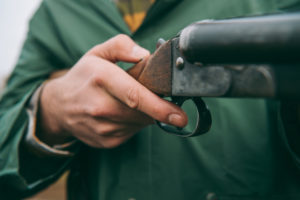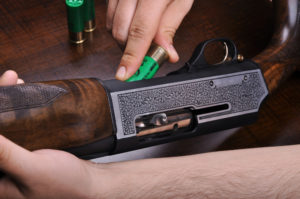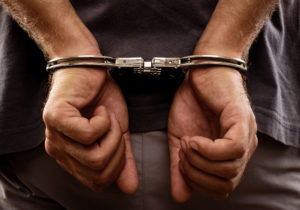You are now 5 hours into a very long day. At oh-dark-thirty a bad guy kicked in your front door. Took him three tries so you had time to meet him armed. In the ensuing encounter, he came in second place. The police and paramedics have come and gone.
Your attorney, that you keep on retainer for self defense gun issues, was there and got you through the investigation without you saying something dumb and getting arrested.
Note: I use US Law Shield – you should find a similar firm for yourself. For the price of a couple of boxes of high end ammo each year you have legal defense against criminal and civil prosecution related to the use of your weapon.
The body has been removed and the gawking neighbors have gone home. You are puzzled at the looks they gave you as they left. Your wife, who was in the bedroom during the shooting, also looked at you funny as she went back to the bedroom.
The door is barricaded closed – that will have to be fixed when things open up a little
Who would have thought the bad guy would bleed like that. Your attorney told you not to talk to anyone about what happened, until all legal issues are settled to keep you from saying something that can be used against you. Funny, only now are you really shaking. The adrenaline is gone, you’re exhausted but no way you’re going to get any sleep in what’s left of the night.
SKIP AHEAD
The Aftermath
Now comes some of the toughest times for the citizen who uses lethal force to defend himself. During the event, things happened without conscious thought, you just did what you had to do. Now, you must deal with the aftermath.
There will be reporters and family members who want the “whole” story. Depending on motivation the “how does it feel to kill someone” sickos will be trying to paint you as some kind of a homicidal maniac while the “he didn’t deserve to die” weepy moralist will be trying to score points by making you guilty of murder (sure it was legal for you to shoot but did you HAVE to KILL him?)
The City of Phoenix PD created a ‘peer counselor’ program staffed by those who had been in lethal force incidents to be with officers involved in shootings or other traumatic incidents like traffic accidents that turned children into body parts.
The city determined that suicide rates were substantially reduced if the officer involved could talk to a ‘safe’ person within 24 hours of the incident. It was discovered that the standard investigative procedure tended to isolate the officer from his society. As in most shootings, the gun used is evidence and is taken by the investigators. For an officer, the badge and gun are signs of belonging. The peer counselor carries a firearm to replace the officer’s service weapon – to let him feel that he still belonged.
As a civilian, we don’t have this kind of arrangement but the needs are still there. The
You are not the only one isolated from your community now. If you have children, the other kids will not be kind. From some, your kids will get the ‘Your daddy’s a murderer’ line and from others a ‘Don’t play with them, you can’t trust their family’. Your neighbors will be formal and polite but very distant. Your family members will treat you differently.
You are different – you’ve taken a human life and IT DOES CHANGE YOU. Priorities change, plans change, hopes and dreams change. Many marriages can not handle the additional stresses. The marriage stress ( you are no longer the person she married ) just adds to the mental and emotional stress on you.
Support
So, how do you get through it. Some don’t, the suicide rate attests to that. If you’ve not thought about these things prior to the shooting, you are at high risk. If you’ve taken the time to come to grips with the fact of what you may be called upon to do with that handgun, you are ahead of the problem.
Don’t think that being a combat vet means you won’t have this problem as well. There is a world of difference between shooting at an enemy soldier at 200 yards as part of a team and seeing the face of a bad guy at 5 feet as your Hydra-Shok rounds turn his chest into hamburger (yes, graphic – make you queasy? The real event is much worse).
At home, before the event ever happens (hopefully it never will), spend some time
Get angry at him for putting you in that spot. Talk it over with your spouse and then with your family. Don’t scare the little ones but make sure they know to stay out of harms way. You don’t want them to come in and see the bad guy bleeding out on your carpet or taking a stray round. Remember, you are NOT shooting to kill. You are shooting to STOP the bad guy from hurting you and your family. If he dies that was HIS choice, not yours.
If at all possible, now is the time to find someone with whom you can talk and I don’t mean a mall-ninja. When I came home from Viet Nam my wife went through about 5 years of this with me. That she stayed always amazes me, but she did. I was so sick of people telling me they ‘knew how I felt’ when they didn’t have a clue of what being so scared that you puke really means, that I just wanted to punch them out. Then I met a man who had spent 5 years as a POW. We talked for about 16 hours straight. He UNDERSTOOD in spades and helped me adjust to the new reality.
Many political leaders, medical and religious professionals don’t have a clue about guns and the effect using one has on a person. They expect the men or women who they have hired to carry out these tasks to be made of steel.
Because of this attitude they often feel superior to those who take arms in their own defense and are of little help as counsel. I have observed that a strong prayer life helps. For those who don’t believe in God, strengthen whatever it is that forms your core beliefs. You must be strong at your core or you won’t make it.
If possible, find someone who has been there. Not the guy who talks about it; find the guy who sits quietly and says little. Watch to see the respect he shows to the flag or the Corps or the nation. Listen to the words he speaks and look at the firearms he may use at the range. The guy with the AR15 tricked out with every “add-on” money can buy but who hasn’t fired it more than twice in 5 years but talks often about shooting Mutant Zombie Bikers is probably not who you need.
The guy who says “Yes, I was in the service” and shuts up may well be the guy you need. Don’t ask about his service – he won’t tell you. Just get to know him and get to be friends. Invite him to the range and learn.
Lastly, killing is not something to be proud of. Anyone who brags about the bad guy’s they’ve killed is either a psychopath or a liar. Being skilled enough and prepared enough to defend your loved ones is worthy of pride. I’ve always found it to be a silent pride – those who are skilled and prepared don’t brag about it. They will share to help others but never to brag.
The key is to be able to continue doing so after a ‘first’ event. Hopefully there will never be a first or, God forbid, a second event but for the sake of the ones you love you must be prepared to survive the aftermath of using deadly force.
Also read Captain Bart’s – Survival Psychology: Deadly Force




